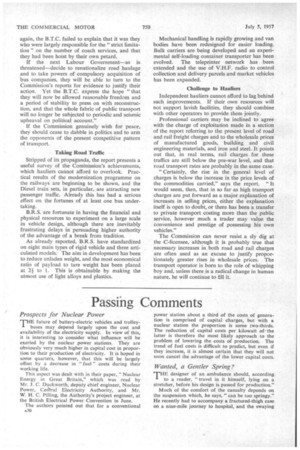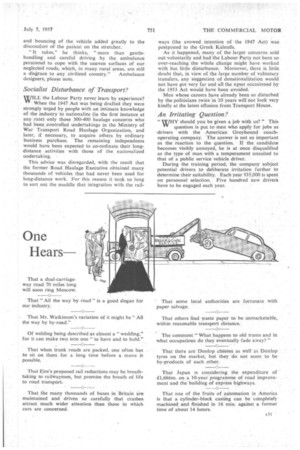Passing Comments
Page 32

Page 33

If you've noticed an error in this article please click here to report it so we can fix it.
Prospects for Nuclear Power
'T'HE future of battery-electric vehicles and trolley'. buses may depend largely upon the cost and availability of the electricity supply. In view of this, it is interesting to consider what influence will be exerted by the nuclear power stations. They are obviously very much higher in capital cost in proportion to their production of electricity. It is hoped in some quarters, however, that this will be largely offset by a decrease in " fuel " costs during their working life.
This aspect was dealt with in their paper, "Nuclear Energy in Great Britain," which was read by Mr. J. C. Duckworth, deputy chief engineer, Nuclear Power, Cenral Electricity Authority, and Mr. W. H. C. Pilling, the Authority's project engineer, at the British Electrical Power Convention in June.
The authors pointed out that for a conventional A30
power station about a third of the costs of generation is comprised of capital charges, but with a nuclear station the proportion is some two-thirds. The reduction of capital costs per kilowatt of-the latter is therefore the most likely approach to the problem of lowering the costs of production. The trend of fuel costs is difficult to predict, but even if they increase, it is almost certain that they will not soon cancel the advantage of the lower capital costs.
Wanted, a Gentler Spring?
THE designer of an ambulance should, according
to a reader, "travel in it himself, lying on a stretcher, before his design is passed for production."
Much of the comfort of the casualty depends on the suspension which, he says, "can be too springy." He recently had to accompany a fractured-thigh case on a nine-mile journey to hospital, and, the swaying
and bouncing of the vehicle added greatly to the discomfort of the patient on the stretcher.
"It takes," he thinks, "more than gentlehandling and careful driving by the ambulance personnel to cope with the uneven surfaces of our neglected roads, which, in many rural areas, are still a disgrace to any civilized country." Ambulance designers, please note.
Socialist Disturbance of Transport?
ViJILL the Labour Party never learn by experience? " When the 1947 Act was being drafted they were strongly urged by people with an intimate knowledge of the industry to nationalize (in the first instance at any rate) only those 300-400 haulage concerns who had been controlled undertakings in the Ministry of War Transport Road Haulage Organization, and later, if necessary, to acquire others by ordinary business purchase. The remaining independents would have been expected to co-ordinate their longdistance activities with those of the nationalized undertaking.
This advice was disregarded, with the result that the former Road Haulage Executive obtained many thousands of vehicles that had never been used for long-distance work. For this reason it took so long to sort out the muddle that integration with the rail
ways (the avowed intention of the 1947 Act) was postponed to the Greek Kalends.
As it happened, many of the larger concerns sold out voluntarily and had the Labour Party not been so over-reaching the whole change might have worked with but little disturbance. Moreover, there is little doubt that, in view of the large number of voluntary transfers, any suggestion of denationalization would not have got very far and all the upset occasioned by the 1953 Act would have been avoided.
'Men whose careers have already been so disturbed by the politicians twice in 10 years will not look very kindly at the latest effusion from Transport House.
An Irritating Question?
" witY should you be given a job with us?" This question is put to men who apply for jobs as ,drivers with the American Greyhound coachoperating company. The answer is not so important as the reaction to the question. If the candidate becomes visibly annoyed, he is at once disqualified as the type of man with a temperament unsuited to that of a public service vehicle driver.
During the training period, the company subject potential drivers to deliberate irritation further to determine their suitability. Each year $35,000 is spent on personnel selection. Five hundred new drivers have to be engaged each year.












































































































